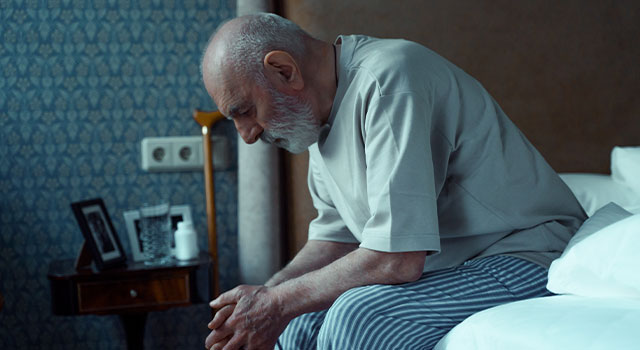 Aging is a risk factor for chronic conditions like cardiovascular disease, Alzheimer’s disease, osteoporosis and age-related macular degeneration (AMD), a sight-threatening eye disease.
Aging is a risk factor for chronic conditions like cardiovascular disease, Alzheimer’s disease, osteoporosis and age-related macular degeneration (AMD), a sight-threatening eye disease.
It stands to reason, then, that slowing or reversing the aging process would have a positive effect on these conditions. Scientists are experimenting with different techniques for “turning back the clock” to promote health and longevity.
But First, What’s AMD?
Age-related macular degeneration is an eye disease that damages the part of the eye responsible for sharp central vision.
The portion of the retina that produces central vision, called the macula, progressively wears down with age, resulting in vision loss and sometimes legal blindness.
There are 2 forms of AMD: wet and dry. Wet AMD causes blood vessels to grow underneath the macula and leak fluid into the retinal tissue. This type of AMD, which affects only about 10% of patients, is more severe and faster-moving than the dry form and results in sudden vision loss.
Dry AMD starts with the formation of drusen (yellow deposits) in the macula that blurs and distorts vision. Over time, the macula deteriorates, leading to loss of vision.
In its early stages, dry AMD doesn’t typically produce symptoms, but advanced AMD can present as reduced or blurred vision, dark spots in your central vision, and worsening color perception.
You’re more likely to develop AMD if you:
- Have a family history of AMD
- Smoke
- Have high blood pressure and high cholesterol
- Are obese
- Are female
- Have light-colored eyes
- Are over the age of 60
Can Aging Be Reversed?
To answer this question, let’s first distinguish between biological age and chronological age.
Your chronological age is what you say in response to the question “How old are you?”
Biological age is how old your body seems on the inside. Scientists are able to determine biological age by analyzing DNA methylation within your genome.
Several factors influence your biological age, including genetics, lifestyle, diet, exercise and demographics. Altering any of these factors can move the dial of your biological age in either direction.
In other words, you can’t change or reverse your chronological age but your biological age is flexible.
Can Age-Related Macular Degeneration Be Cured?
While science hasn’t yet found a cure for AMD, it can be successfully managed and treated to minimize the risk of vision loss.
You can also try adjusting your lifestyle and habits to prevent or delay its onset. Your optometrist will guide you on what adjustments to make based on your ocular health, risk factors and current habits.
In a promising development, a small study was conducted in 2021 by a cohort of medical experts to analyze the effects of diet and lifestyle changes on biological aging, and to determine if these changes could ward off age-related diseases like AMD.
The study, which was published in Aging, included 43 healthy males who adhered to a very specific diet, including lots of dark leafy greens, cruciferous vegetables, lean animal protein and specific phytonutrients.
In just 8 weeks, the men were able to reduce their biological age by 3 years!
The researchers concluded that a future large-scale study is required to determine whether their small study’s findings are significant and could indeed have an impact on age-related illnesses.
Low Vision Services in Lititz
It remains to be seen whether turning back the clock on aging may prevent AMD and other eye diseases. Until then, having regular eye exams by your eye doctor is the best way to ensure the disease is diagnosed and treated early.
If you’ve been diagnosed with AMD or are at risk of developing it, Low Vision Optometry of Central Pennsylvania is here for you.
Our low vision eye doctors help patients manage their condition, prevent further vision loss and learn to cope with impaired vision.
Living with any amount of vision loss is a challenge, but low vision aids and devices can help patients continue living independent and meaningful lives.
To schedule your low vision consultation and learn more about our eye care services, call Low Vision Optometry of Central Pennsylvania in Lititz today.
Our practice serves patients from Lititz, Lancaster, York, and Hershey, Pennsylvania and surrounding communities.
Frequently Asked Questions with Dr. Yanna Nachtigall
Q: What are some examples of low vision aids and devices?
A: Whether you like to watch TV, read, play cards, drive or go walking, there’s a low vision aid or device that can help you partake in these activities, even with low vision. Some popular low vision aids include telescope glasses, microscope glasses, bioptic telescopes, e-scoop glasses, prism glasses, closed-circuit TV, handheld magnifiers and digital magnifiers. Book your low vision consultation to discover which products best suit your needs and lifestyle.
Q: Do patients with AMD need two eye doctors?
A: Generally, patients with eye disease need a doctor to treat the condition or perform surgery if necessary. They also need a low vision optometrist, who co-manages the condition while offering support on how to cope with vision loss. A low vision optometrist may be able to improve your vision or quality of life thanks to their specific training, expertise and equipment. Call Low Vision Optometry of Central Pennsylvania to schedule your appointment today!
